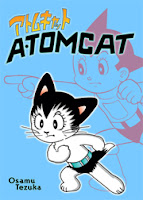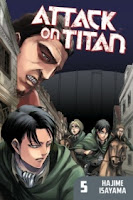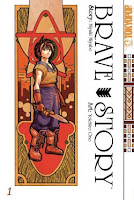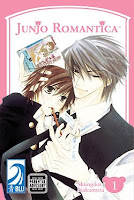My News and Reviews
Last week was the Skip Beat! Manga Moveable Feast, hosted by Laura at the wonderful shoujo manga blog Heart of Manga. For my contribution to the Feast, I reviewed the first omnibus volume of Yoshiki Nakamura’s Skip Beat! I had read the beginning of Skip Beat! before, but had forgotten how much I had enjoyed the series. It’s a tremendous amount of fun. Earlier in the week I reviewed Sakyo Komatsu’s award-winning earthquake disaster novel Japan Sinks. It’s been forty years since the volume was first released in Japan and it is still a chilling account.
As somewhat of a bonus, over the weekend I also reviewed Dale Lazarov’s and Amy Colburn’s short collection of gay erotic comics, Manly. Out of all of Lazarov’s collaborations, Manly happens to be my personal favorite. It’s not manga, but I do think it would appeal to readers and fans of hard yaoi and bara and erotic comics in general.
While working on my review of Manly, I discovered that Bruno Gmünder, its publisher, will be releasing Gengoroh Tagame’s Endless Game in December. Earlier this year PictureBox published The Passion of Gengoroh Tagame, which was incredible, so I’m pretty excited that more of Tagame’s work is being released in English. In other licensing news, Sublime Manga has announced the acquisition of Kou Yoneda’s collection NightS, which I’m looking forward to reading, as well as additional volumes in previously acquired series.
Elsewhere online, Manga Bookshelf has published the results from its recent reader survey. I find this sort of data fascinating, so I was very glad that they decided to share it! Finally, over at Books from Japan, Matt Alt contributed the article A wild monster chase: yokai and Haruki Murakami. Alt is one of the co-creators of the marvelous Attack! series, which I love. Surprisingly enough, I actually haven’t read much Murakami, but I still found Alt’s article to be fascinating.
Quick Takes
 Atomcat by Osamu Tezuka. I was completely unaware of Atomcat until it and Triton of the Sea were tacked on to Digital Manga’s Kickstarter project for Unico. Of the three works I was least interested in Atomcat, but the volume turned out to be a fun and fluffy read. (Pun entirely intended.) Atomcat is a remake of sorts of Tezuka’s Astro Boy. The basic premise is that, in a bizarre twist of fate involving space aliens, a small kitten is granted the same powers as Astro Boy. He also faces some of the same personal dilemmas that Astro Boy had to deal with. Atom, the kitten, uses his new powers to protect his human family and to foil the evil schemes of other cats. It’s really quite cute.
Atomcat by Osamu Tezuka. I was completely unaware of Atomcat until it and Triton of the Sea were tacked on to Digital Manga’s Kickstarter project for Unico. Of the three works I was least interested in Atomcat, but the volume turned out to be a fun and fluffy read. (Pun entirely intended.) Atomcat is a remake of sorts of Tezuka’s Astro Boy. The basic premise is that, in a bizarre twist of fate involving space aliens, a small kitten is granted the same powers as Astro Boy. He also faces some of the same personal dilemmas that Astro Boy had to deal with. Atom, the kitten, uses his new powers to protect his human family and to foil the evil schemes of other cats. It’s really quite cute.
 Attack on Titan, Volume 5 by Hajime Isayama. While the artwork in Attack on Titan is improving very slowly, it’s still easily the weakest element in the manga. But as bad as the art can be, I continue to find the manga as a whole to be oddly engaging and at times even compelling. In addition to introducing more characters, the fifth volume reveals a little bit more about the titans and a little bit more about the society in which the humans are living. I didn’t find this volume to be quite as dark or oppressive as some of the volumes that came before it. The fear and terror caused by the titans is still there and very real, but the story has left the battlefield and turned to focus more on the societal changes and political maneuverings that have been brought about as a result.
Attack on Titan, Volume 5 by Hajime Isayama. While the artwork in Attack on Titan is improving very slowly, it’s still easily the weakest element in the manga. But as bad as the art can be, I continue to find the manga as a whole to be oddly engaging and at times even compelling. In addition to introducing more characters, the fifth volume reveals a little bit more about the titans and a little bit more about the society in which the humans are living. I didn’t find this volume to be quite as dark or oppressive as some of the volumes that came before it. The fear and terror caused by the titans is still there and very real, but the story has left the battlefield and turned to focus more on the societal changes and political maneuverings that have been brought about as a result.
 Brave Story: A Retelling of a Classic, Volumes 1-5 by Yoichiro Ono. The Brave Story manga is a very loose adaptation of Miyuki Miyabe’s fantasy novel of the same name. The manga series reached twenty volumes in Japan before its conclusion, but only five volumes were ever released in English. While many of the major story elements and characters are the same as those found in the novel, the manga is actually quite different. Unfortunately, I didn’t find it to be quite as good, either. Although Brave Story is a seinen series, Ono makes excellent use of shonen tropes which is very appropriate for the story. Brave Story in all of its incarnations is also heavily influenced by fantasy role-playing video games.
Brave Story: A Retelling of a Classic, Volumes 1-5 by Yoichiro Ono. The Brave Story manga is a very loose adaptation of Miyuki Miyabe’s fantasy novel of the same name. The manga series reached twenty volumes in Japan before its conclusion, but only five volumes were ever released in English. While many of the major story elements and characters are the same as those found in the novel, the manga is actually quite different. Unfortunately, I didn’t find it to be quite as good, either. Although Brave Story is a seinen series, Ono makes excellent use of shonen tropes which is very appropriate for the story. Brave Story in all of its incarnations is also heavily influenced by fantasy role-playing video games.
 Junjo Romantica, Volumes 1-6 by Shungiku Nakamura. I’m torn over Junjo Romantica. The boys’ love series features four related storylines/couples: Junjo Romantica, Junjo Egoist, Junjo Minimum, and Junjo Terrorist. I like the narrative structure and how the stories intertwine with each other. I also like how almost everyone is somehow involved with the publishing industry or studies literature. But the only pairing that I really like and the reason I read Junjo Romantica is Egoist. (Although Minimum is admittedly adorable.) The relationship of Junjo Romantica‘s main couple is not at all a healthy one. Usagi is abusive and extremely controlling. It makes me uncomfortable how this has been romanticized. Fortunately after the first couple of volumes this does improve.
Junjo Romantica, Volumes 1-6 by Shungiku Nakamura. I’m torn over Junjo Romantica. The boys’ love series features four related storylines/couples: Junjo Romantica, Junjo Egoist, Junjo Minimum, and Junjo Terrorist. I like the narrative structure and how the stories intertwine with each other. I also like how almost everyone is somehow involved with the publishing industry or studies literature. But the only pairing that I really like and the reason I read Junjo Romantica is Egoist. (Although Minimum is admittedly adorable.) The relationship of Junjo Romantica‘s main couple is not at all a healthy one. Usagi is abusive and extremely controlling. It makes me uncomfortable how this has been romanticized. Fortunately after the first couple of volumes this does improve.
Leave a Reply